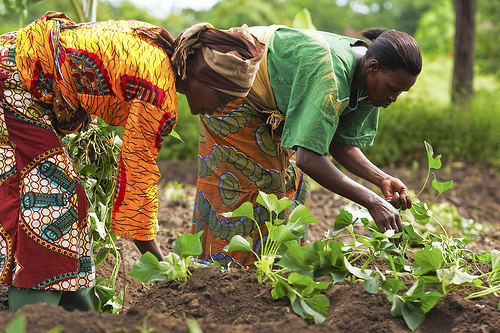There is a widespread hunger facing Africa and other parts of the world, these have informed an urgent need to increase farm production in the bid to feed the growing population. Governments are pushing for industrial agriculture which seems to be a costly choice for both the economy and the environment. Greenpeace (2015) report shows that ecological farming would ensure a better future; increase farm productivity and profits for small scale farmers with a more earth friendliness. However, observations from researches carried out amongst small scale farmers within the Ogoni axis, show that for them to have money for inputs (fertilizer and genetically modify seed), they sell their crops and animals; the items that they spent time, money and energy to raise. So each year, the soil becomes unhealthier and the farmers try to buy even more fertilizers and seeds. These have proving to the fact that reliance on external inputs like chemical fertilizers, pesticides and improve seedlings by small holder farmers make them vulnerable to price rises. Food production by small scale farmers using organic method ensures healthy farming and also, is environmentally friendly. On the contrary, the draw-back of industrial farming is the use of chemical fertilizers and pesticides, which constitute health and environmental hazards. The chemical residue which accumulates in the produce raises serious health concerns and food safety issues. In its usage, the chemicals can be leached into groundwater and as well as the run-off into surface water which harms aquatic biodiversity, people during production, and of course degrade the environment, including the soil. According to Wells (2009), this type of farming is disadvantageous to small-scale or rural farmers because of the cost of inputs. Industrial farming has also been criticized as being wasteful and unsustainable because it encourages the depletion of renewable resources. Industrial agriculture contributes about 14% of all human caused greenhouse gas emissions, mostly from the production and use of synthetic fertilizers and livestock. Industrial agriculture relies on monocultures that destroy biodiversity, making crops more susceptible to pest infestations and in turn increasing the need for toxic pesticides. Over reliance on external inputs (e.g. chemical fertilizers and pesticides) increase the cost of farming and this in turn has increased the cost of livelihood in Ogoni axis. Also, reliance on monoculture crops by the small-scale farmers has increased their vulnerability to fluctuations in the cost of agrochemicals and the commodities marketed in global space or market. This has led to the continuous reduction of cash in terms of profits. The bid by external corporate agribusinesses to consolidate on the supply of inputs, gives them access to gain control over the Ogoni food supply chain Thus, leading to the farmers being paid miniature for their produce. The International Assessment of Agricultural Knowledge, Science and Technology for Development (IAASTD) report on Sub-Saharan Africa has proven that, “investing in agro-ecological approaches can be highly effective in boosting food security, production, incomes and resilience to climate change and empowering communities.” Building on agro-ecological practices which reduces the burden of farmers from dependence on expensive fossil fuel-based inputs and industrialized seeds, and put the people at the center of planning and management, can lead to the high level production and sustainability of food chain in Ogoni land. According to Greenpeace report Fostering Economic Resilience (2015) an analysis assessing 114 cases in Africa revealed that the conversion of farms to organic methods increased agricultural productivity by 116%. In Kenya, maize yields increased by 71% and bean yields by 158%. Moreover, the more increase diversity in food crops available to farmers, the more varied diets and thus improved nutrition available for food consumers. Undoubtedly, small scale farmers are the bedrock of Nigeria economy. They support the entire food production system; so, there is need to pressurize the government to implement existing policies which are agricultural friendly and tackle the growing corporate control of food chain in the nation to enable agricultural-shift from industrial farming to ecological farming system.
Aalo Anthony.







